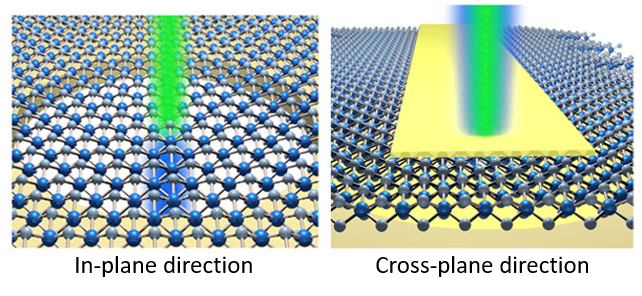Wednesday, 10 November 2021
New understanding of heat dissipation in 2D materials can lead to better thermal management of electronic devices
A study led by the ICN2 Phononic and Photonic Nanostructures Group (P2N) and recently published in ACS Nano Letters investigates thermal properties of crystalline films of SnSe2 (a two-dimensional material). This work provides new information on heat transport in 2D materials, useful for the design of electronic devices with improved heat control.

Thermal management in electronic and communication devices is currently a very relevant technological issue, as increasing miniaturisation and power consumption can lead to overheating and, consequently, poor performance. Therefore, the study of heat propagation in two-dimensional materials is very relevant to assess their potential for applications that pose thermal management constraints. Among many promising 2D materials showing appealing and useful characteristics is tin diselenide (SnSe2), whose properties are already being harnessed in field-effect transistors (FET), memories and optoelectronic devices. Recently interest on possible thermoelectric application of SnSe2 has risen, thus an in-depth investigation of its thermal properties is required.
A paper published in ACS Nano Letters reports on a systematic study of the in-plane and cross-plane thermal conductivity of crystalline SnSe2 films of different thickness (between 16 and 190 nm, depending on the number of atomic layers stuck one on top of the other), conducted by means of two distinct characterization techniques –i.e. Raman thermometry and frequency domain thermoreflectance. This work was carried out by the ICN2 Phononic and Photonic Nanostructures Group, led by ICREA Prof. Dr Clivia Sotomayor-Torres, in collaboration with members of the National Center for Scientific Research “Demokritos” of Athens (Greece). First authors of the scientific article are Peng Xiao and Dr Emigdio Chavez-Angel, from Prof. Sotomayor-Torres’ team, and corresponding author is Dr Alexandros El Sachat, previously member of the same ICN2 group and currently Marie Skłodowska-Curie fellow at the “Demokritos” centre.
The specific crystalline structure of materials determines their capacity of conducting heat along different directions, as in the case of SnSe2, where the in-plane direction (moving along the surface) and the cross-plane one (moving through the thickness) are considered. The authors of this research analysed how thermal conductivity in the two directions changed as a function of the sample thickness, unveiling that the thermal conductivity anisotropy ratio, which is given by the proportion of the in-plane and cross-plane conductivities, is independent of the SnSe2 film thickness. It is also quite high: this means that heat tends to propagate faster along the in-plane direction than along the cross-plane one.
The in-plane thermal conductivity was observed to decrease when ambient temperature increases, but this strong dependence on temperature becomes weaker as film thickness is reduced. In addition, this work provided the first experimental evidence of the contribution of the phonon mean free path to the in-plane and cross-plane thermal conductivity in this material.
This study provides new and useful information on heat and phonon transport in 2D materials, which can help design electronic devices with improved thermal management. The high anisotropy in terms of thermal conductivity of SnSe2 can be very advantageous for applications in which it is desirable to have heat dissipating mainly in one direction, while preserving thermal insulation in the other. This is what happens for heat-sensitive electronic components – such as microchips—, where directional heat flow is required to facilitate cooling and prevent hot spots.
Reference article:
Peng Xiao, Emigdio Chavez-Angel, Stefanos Chaitoglou, Marianna Sledzinska, Athanasios Dimoulas, Clivia M. Sotomayor Torres, and Alexandros El Sachat, Anisotropic Thermal Conductivity of Crystalline Layered SnSe2. Nano Lett. 2021. DOI: 10.1021/acs.nanolett.1c03018

